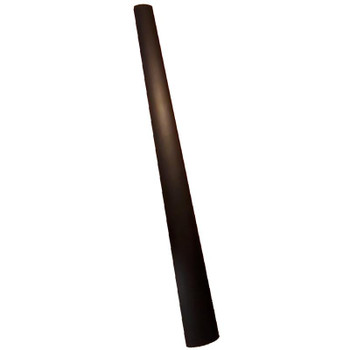V. Richelieu
GaiaTone Eco-Friendly 3/4 Size Fingerboard for Upright Bass
We ship worldwide! (Read this)
- FREE SHIPPING:
- To Continental US (Lower 48)
Description
These new eco-friendly fingerboards offer many benefits over natural ebony. For one, you're saving the trees. Now, that's only a hippie platitude if the switch to an alternative to the real ebony stinks in real-world application, but that's not the case here; the other benefits are that the Gaiatone material is more durable (wears longer) and more stable (won't warp) than real ebony. On the bench, it will work like real ebony (though its hardness will dull your tools a bit faster) and it glues up using hide glue the same as regular wood. So it's a real win!
Ebony, historically used for violin fingerboards, tailpieces, pegs, nuts, saddles and chinrests, is under extreme pressure in our world of diminishing resources. Development, roads, agriculture and logging have depleted ebony reserves in natural forests. In response, V. Richelieu™ has used modern materials to create these fingerboards, made of beautiful, all-natural, and fully functional ebony alternatives. GaiaTone fingerboards are visually nearly indistinguishable from ebony and yet are made from 95% post-consumer paper waste bound with bio-resins. GaiaTone fittings are petroleum free.
Luthier workshops will find GaiaTone an economically and visually similar alternative to ebony. GaiaTone fingerboards are sufficiently porous to bind with hide glues. The stock shape can be adjusted with sandpaper, rasps, and planes along the top and bottom surfaces. The dark, black color is consistent throughout the product, so you won't ever sand or plane down through the outer color to some other color underneath. GaiaTone fittings have similar technical specifications to ebony, but are harder, require less adjustments and are more stable.
GaiaTone Fittings are milled in Vermont, USA. Fingerboards have scoop, undercuts, rounded edges - they are pretty much ready to install right out of the package!
Available Models
We have the following size options for these great boards:
- Standard 3/4 Size Bass
This board is profiled to fit most common 3/4 size basses without much extra work (though you should expect some minor refinements on any bass, since they all have their subtle differences.
Width at nut: 1.7" / 43.4mm
Width at bottom: 3.5" / 88.8mm
Overall Length: 34.25" / 87cm - Kay/Engelhardt 3/4 Size
Kay and Engelhardt basses normally have narrower necks, so this should be a better fit without need for further work, if you're replacing the board on a stock Kay/Engelhardt neck.
Width at nut: 15.75" / 40mm
Width at bottom: 3.5" / 88.9mm
Overall Length: 33" / 83.8cm
All fingerboards are a solid black color, which visually is almost indistinguishable from ebony.
Working Tips:
The Gaiatone fingerboard material is very stable and very hard. It works well with milling but is a bit hard on plane blades, wearing them down/dulling them quicker than normal ebony might. These fingerboards are designed to be “ready to go”. You make minor adjustments to the neck to fit the fingerboard. You blend the two together with a rasp and sandpaper and smooth the upper surface of the fingerboard with 320, 400 grit if you want a glassier surface, or leave it as is. A little light oil rubbed into the surface is nice too. The fingerboard glues on with hide glue. We have some videos on the website of ways to adjust the edges with tools most luthiers already have.









